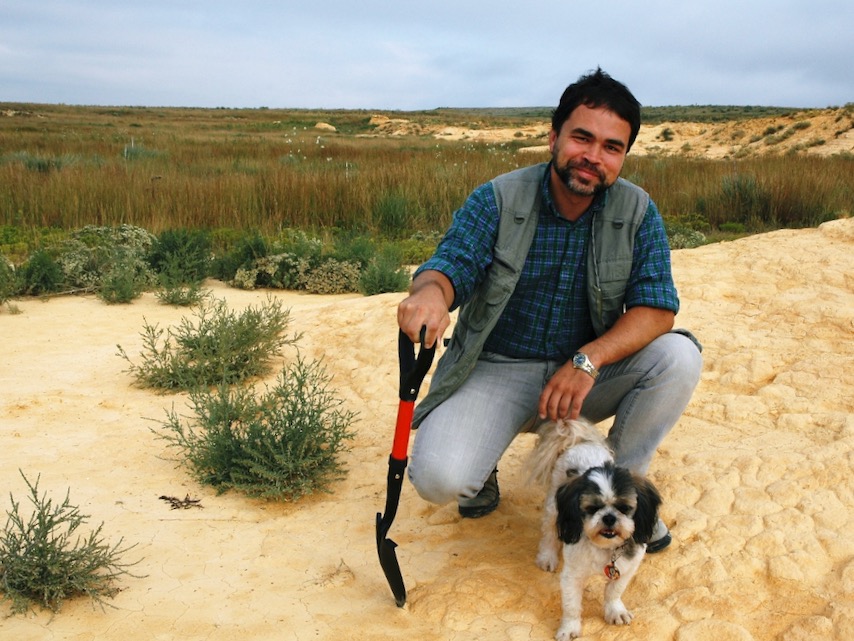STCC graduate discovers dinosaur species: ‘This is my passion in life’
 Sebastian Dalman takes a break from field work outside Hays, Kansas. He and Teddy the dog stand atop marine sediment from the time when North America was cut through in the middle by the western interior seaway around 80 million years ago.
Sebastian Dalman takes a break from field work outside Hays, Kansas. He and Teddy the dog stand atop marine sediment from the time when North America was cut through in the middle by the western interior seaway around 80 million years ago.
SPRINGFIELD, Mass. – Sebastian Dalman, a Springfield Technical Community College graduate, loved playing with dinosaurs when he was a little boy living in Poland.
Today, the extinct creatures that captured his childhood imagination remain a big part of his life. You might even say he now gets paid to “play” with them. He looks for bones and has discovered 17 previously unknown species. Some of his discoveries have been described and published; others await their formal description.
“I have been hooked on dinosaurs since I was 6 years old, so this is a passion in my life. I live and breathe dinosaurs,” Dalman said, who graduated from STCC in 2003.
Now 47, Dalman works as a paleontologist and research associate at the New Mexico Museum of Natural History and Science in Albuquerque, N.M.
As a 2017 article published in the Albuquerque Journal about Dalman stated, he “can now claim bragging rights for discovering a new species of dinosaur.”
Dalman was also interviewed by Newsweek in December 2018. He led a team of paleontologists who discovered a new species of a horned dinosaur. Dalman and his colleagues examined a partial skeleton of a dinosaur found over 20 years ago and determined that it is a new species, a member of a family that includes the horn faced Triceratops.
As someone who immigrated to the United States from Elblag, Poland, in 1993 without a prior knowledge of the English language, Dalman is a stellar example of how STCC helps to transform lives. He enrolled in STCC in 1997, just four years after he left Poland. At the time, he was working low-paying jobs and thinking about his future. He met an English instructor from STCC who explained to him how to apply.
STCC gave me a chance to get my first degree, helped me to learn English, and opened other doors to further my education.Sebastian Dalman, Paleontologist and 2003 graduate of STCC
“I decided to go to school without any knowledge of English,” Dalman said. “First I struggled to get through because my English wasn’t good at the time, but I met some people who were an inspiration to continue on path and who helped me to become successful in life.”
Dalman was determined to learn English. However, he flunked English the first time he took the class, but did well in his other class, algebra, which gave him hope. He persisted, graduating in 2003 with an associate degree in Liberal Arts Transfer. During his last year at STCC, he was on the dean’s list.

Paleontologist Sebastian Dalman holds the horn of a newly discovered dinosaur species uncovered in south-central New Mexico. The fossilized remains are being stored in an annex building across from the Museum of Natural History and Science. (Credit: Roberto E. Rosales/Albuquerque Journal)
He then went to the University of Massachusetts, Amherst, where he earned a bachelor’s degree in geology. In 2008, he was accepted to Fort Hays State University in Hays, in Hays,, Kansas, and obtained a master’s degree in biology and geology. The educational journey, which began at STCC, led him to a dream job as a paleontologist.
He cites STCC as a transformative experience and fondly looks back on his time. He recalled how professors were encouraging and supportive.
STCC Professor Kenneth Petit remembers teaching principles of biology to Dalman, who he said was a unique student.
“Unlike the vast majority of first-year students who are still investigating and deciding upon career pathways, Sebastian was laser-focused on a career in paleontology,” Petit said. “He knew exactly what he wanted and where he wanted to be. His passion for paleontology was evident each time we spoke. I am not surprised to learn of his accomplishments in the field, and I am happy he is living his dream."
Dalman advises STCC students and anyone thinking of a career to find something they love, follow their heart and to never give up their dreams no matter how difficult it may be to achieve them.
“I made paleontology to be my profession because I am passionate about what I am doing. Very passionate,” Dalman said. “STCC gave me a chance to get my first degree, helped me to learn English, and opened other doors to further my education. I can speak common and scientific English and I am fluent in several other languages.”
Dalman moved from Massachusetts to Albuquerque, New Mexico in 2015 to do field work. He was regularly in the field searching for dinosaur bones until last year. He described the excitement of unearthing a bone or tooth from a long-extinct animal. “We discovered almost complete skeletons,” he said.
He said that he published 40 peer reviewed scientific papers. Now due to the pandemic, he’s not working in the field, but is continuing to write and to conduct his scientific research from home.
Dalman dreams of opening an educational center and a museum of natural history to teach about the dinosaurs of North America. Dinosaur fossils have been found on every continent, including in Western Massachusetts. Locally, dinosaur footprints can be found in several locations, including South Hadley and Holyoke. The footprints date to the early Jurassic period some 200 million years ago when the supercontinent called Pangaea began to fragment and as a result North America separated from Africa and Europe, giving birth to the Atlantic Ocean.
In the western United States, dinosaur bones are abundant. Dalman hopes one day to conduct fieldwork in South Dakota, an area rich with fossils, and continue on with his fieldwork in New Mexico.
“I am working with paleontologists from New Mexico, Pennsylvania, South Dakota, but also from abroad from Mexico and the United Kingdom. We’re all excited when we discover dinosaur bones, but also plant material, and other animals that lived among the dinosaurs. We’re the first to see something that’s been underground for millions of years. We’re like kids in a candy store,” Dalman said. “I can’t wait to get back in the field again.”
Interested in applying to STCC? Visit stcc.edu/apply or call Admissions at (413) 755-3333.
About Springfield Technical Community College
STCC, the Commonwealth's only technical community college, continues the pioneering legacy of the Springfield Armory with comprehensive and technical education in manufacturing, STEM, healthcare, business, social services, and the liberal arts. STCC's highly regarded workforce, certificate, degree, and transfer programs are the most affordable in Springfield and provide unequalled opportunity for the vitality of Western Massachusetts. Founded in 1967, the college – a designated Hispanic Serving Institution – seeks to close achievement gaps among students who traditionally face societal barriers. STCC supports students as they transform their lives through intellectual, cultural, and economic engagement while becoming thoughtful, committed and socially responsible graduates.
MEDIA CONTACT:
Jim Danko, (413) 755-4812, jdanko@stcc.edu
